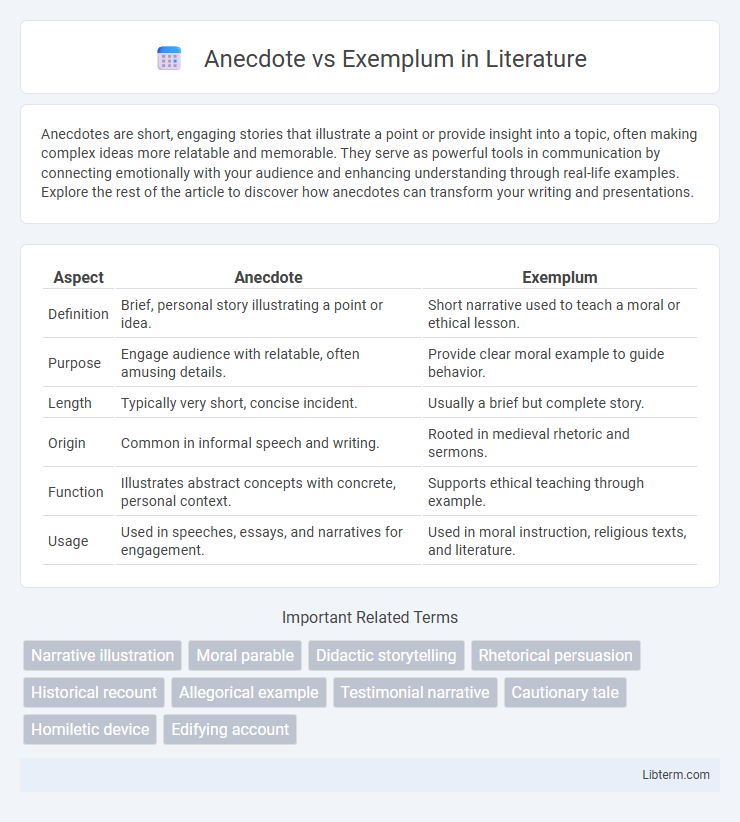Anecdotes are short, engaging stories that illustrate a point or provide insight into a topic, often making complex ideas more relatable and memorable. They serve as powerful tools in communication by connecting emotionally with your audience and enhancing understanding through real-life examples. Explore the rest of the article to discover how anecdotes can transform your writing and presentations.
Table of Comparison
| Aspect | Anecdote | Exemplum |
|---|---|---|
| Definition | Brief, personal story illustrating a point or idea. | Short narrative used to teach a moral or ethical lesson. |
| Purpose | Engage audience with relatable, often amusing details. | Provide clear moral example to guide behavior. |
| Length | Typically very short, concise incident. | Usually a brief but complete story. |
| Origin | Common in informal speech and writing. | Rooted in medieval rhetoric and sermons. |
| Function | Illustrates abstract concepts with concrete, personal context. | Supports ethical teaching through example. |
| Usage | Used in speeches, essays, and narratives for engagement. | Used in moral instruction, religious texts, and literature. |
Introduction to Anecdote and Exemplum
Anecdote and exemplum both serve as illustrative tools in rhetoric, with anecdotes being brief, engaging personal stories that highlight a specific point or theme. Exemplum, rooted in classical rhetoric, is a more formal example or narrative used to teach moral lessons or support arguments, often drawn from historical, religious, or literary sources. Understanding the introduction to anecdote versus exemplum clarifies their distinct roles in persuasive communication and storytelling.
Defining Anecdote
An anecdote is a short, engaging narrative used to illustrate a point or reveal a truth, often based on real-life experiences. It typically emphasizes personal moments or specific incidents to evoke emotions and connect with an audience. Unlike exemplum, which serves as a moral example in rhetorical or literary contexts, an anecdote prioritizes relatability and immediacy over direct ethical instruction.
Defining Exemplum
An exemplum is a short narrative or example used to illustrate a moral point or to support an argument, commonly found in medieval literature and sermons. Unlike an anecdote, which is a brief personal story often shared to entertain or reveal character, an exemplum serves a didactic purpose, providing a clear, instructive illustration of a principle or lesson. The use of exempla helps to reinforce ethical teachings through relatable or historical incidents that emphasize cause and effect within a moral framework.
Key Differences Between Anecdote and Exemplum
An anecdote is a brief, entertaining story about a real incident or person, often used to illustrate a point or add personal insight. An exemplum, by contrast, is a moralizing narrative or example traditionally employed in medieval sermons to teach ethical lessons or reinforce religious doctrines. The key difference lies in their purpose: anecdotes primarily entertain or provide relatable context, while exempla serve explicit instructional and didactic functions.
Historical Origins and Development
Anecdotes originated in classical antiquity as brief, amusing or insightful stories used by historians like Plutarch to illustrate human nature or moral lessons, while exempla developed primarily in medieval sermons as instructive narratives to teach ethical behavior within Christian doctrine. The evolution of anecdotes reflects a broader literary tradition aimed at capturing personal character details and humor, contrasting with exempla's function in reinforcing religious morals and communal values through didactic storytelling. Both forms influenced narrative techniques but served distinct purposes aligned with their historical and cultural contexts.
Functions in Literature and Rhetoric
Anecdotes function as brief, engaging stories that personalize abstract concepts and make arguments more relatable in both literature and rhetoric. Exempla serve as moral or instructive examples, reinforcing ethical lessons and supporting persuasive appeals by illustrating principles through concrete cases. Both devices enhance credibility and emotional connection, but anecdotes emphasize personal experience while exempla highlight generalized truths.
Common Uses in Modern Writing
Anecdotes and exempla serve distinct roles in modern writing, with anecdotes commonly used to engage readers through personal or relatable stories that illustrate a point. Exempla function as authoritative examples or moral lessons, often drawing from historical, literary, or cultural references to support an argument or enhance persuasion. Both techniques enrich narratives and essays by adding concrete evidence that appeals to emotion and logic, improving reader connection and understanding.
Impact on Persuasion and Storytelling
Anecdotes create emotional connections by sharing brief, personal stories that engage audiences and make arguments relatable, enhancing persuasion through empathy. Exempla, rooted in historical or moral examples, reinforce credibility and illustrate broader principles effectively, strengthening the logical appeal in storytelling. Both techniques improve retention and impact but serve different rhetorical purposes: anecdotes personalize messages, while exempla provide authoritative backing.
Notable Examples in Famous Works
Anecdotes serve as brief, engaging stories that illustrate a point, famously seen in Mark Twain's humorous tales used to highlight human nature. Exempla, on the other hand, function as moral examples embedded in medieval sermons, such as those found in the "Parson's Tale" of Geoffrey Chaucer's *The Canterbury Tales*. Both narrative techniques enhance rhetorical impact by providing relatable, concise illustrations drawn from notable literary works.
Choosing Between Anecdote and Exemplum
Choosing between anecdote and exemplum depends on the context and purpose of the communication. Anecdotes offer brief, personal stories that create emotional connections and illustrate a point vividly, while exempla provide structured historical or moral examples that reinforce arguments with authoritative weight. Effective selection hinges on whether the goal is to engage an audience with relatable experiences or to persuade through well-established ethical or cultural precedents.
Anecdote Infographic

 libterm.com
libterm.com